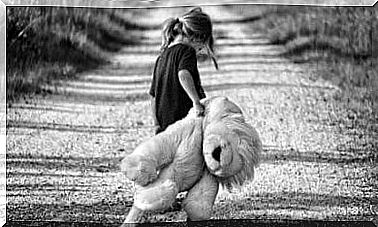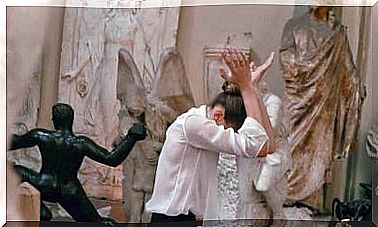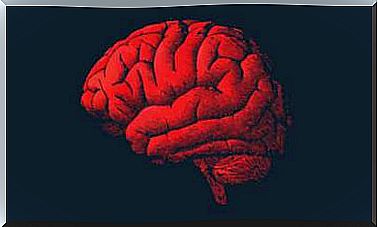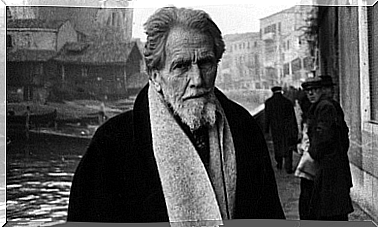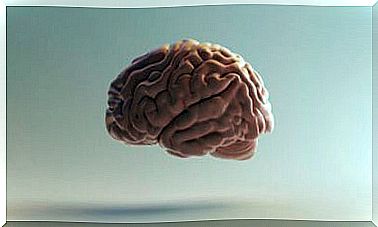Erich Fromm And His Theory On Humanistic Psychoanalysis
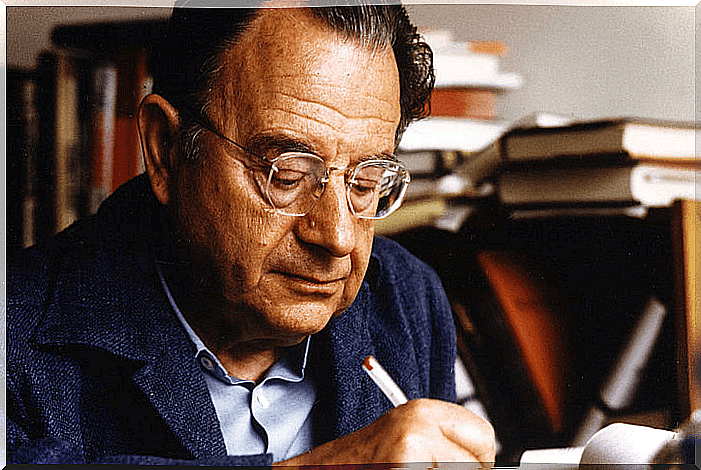
For Erich Fromm, the main task of the human being in life is to give birth to himself in order to become what he really is, someone more noble, stronger and freer. These and other reflections demonstrate that humanistic perspective, as well as revolutionary, of a figure of great relevance within psychology. In addition, we also talk about what some consider the philosopher of love.
When we refer to psychoanalyst theory, there are those who make the mistake of seeing it as a whole, as the same rigid and specific entity inhabited by very clear concepts, dynamics and approaches enunciated by the father of psychoanalysis, Sigmund Freud. Perhaps we forget that within this current there are schools and forms of thought that have enriched the foundations of psychoanalysis, deviating from the word and the ideas of Freud.
Erich Fromm was one of these “deviants.” It was in the 40s when this social psychologist, of Jewish-German origin, decided to break with the psychoanalytic doctrine with which they worked at the “Institute for Social Research at the University of Frankfurt” and to completely renew theory and practice, bringing it closer together. to a much more cultural, humane approach.
For example, he reformulated the idea of libido development for a more feasible one. A new conception in which he enunciated and articulated the assimilation and socialization processes of the individual.
Likewise, we could say without mistake that Fromm was above all a fascinating thinker, a philosopher and one of the best representatives of 20th century humanism.
In his 3 most important books: The fear of freedom, The art of loving and The heart of man, he left us a universe of thoughts, reflections and theories where psychology goes hand in hand with anthropology and history, and where his Once the legacy of Sigmund Freud and Karen Horney were also very present.

Erich Fromm and the systemic crisis of Western society
To understand Erich Fromm’s theory of humanist psychocanalysis, it is necessary to know the person, understand his roots, his context and that drifting world that formed his most immediate reality. In this way we will be in a position to understand what served as a guide and inspiration for his theories.
When one reads his autobiography, Beyond the Chains of Illusion , and stops above all in his childhood and adolescence, one realizes instantly that they were not exactly happy times for Erich.
Fromm’s father was a fairly aggressive businessman, his mother suffered from chronic depression and was also brought up in a markedly strict environment under Orthodox Jewish schemes. He says that during this time he lived two moments that marked him.
The first was the suicide of a 25-year-old girl with whom he was in love as a child. She was a painter and was very close to her only family: her father. He died suddenly, and a few days later the young artist decided to take her own life. His suicide made Fromm wonder. ..why? What makes people go to such extremes?
The second event that marked him was the outbreak of the First World War. Then came the shadow of nationalism, the radicalization of the masses, the hateful messages and the eternal differentiation between “us” and “them”, between my identity and yours, your religion and mine, my vision. of the world and the “unacceptable” view of yours.
The world was fragmenting, and these cracks not only opened insurmountable distances between different powers, but also began a period of systemic crisis throughout society. All the psychological, philosophical and social theories enunciated so far had to be reformulated in search of answers and explanations in the face of such chaos …
A vision for understanding and hope in the human being
Reading the work of Erich Fromm is almost essential to understand all that period of crisis of values, principles and social policies that began in the first half of our twentieth century where the two world wars, so to speak, undermined our faith in The humanity.
However, to read Fromm is to reconcile yourself precisely with humanity. Because it speaks to us of hope and, above all, it provides us with great resources from the human sciences and from psychoanalysis itself to initiate a positive and creative transformation …
Let us now look at the basic principles of his theory.
From biological-mechanistic man to biological-social man
Erich Fromm accepted a large part of the concepts developed by Sigmund Freud: the unconscious, repression, defense mechanisms, transference, the concept of dreams as an expression of the unconscious and of course, the relevance of childhood as the root of many psychological disorders.
- Now, something that Fromm could not tune into was with that vision of the human being as a biological-mechanistic entity, as a being that responds exclusively to the will of “It”, to that entity that seeks to satisfy the basic impulses of aggressiveness, survival and reproduction.
- Erich Fromm spoke to us of the biological-social man to extol that “psychology of the self”, where people do not limit ourselves only to reacting or defending ourselves against our impulses or instincts. It is necessary to expand fences and become aware of the social, and how sometimes the most significant figures for a child can generate adverse and traumatic processes.
- Interpersonal relationships are now positioned with Fromm as backbones that completely replace the classic theory of the evolution of libido, as a motivational and mechanistic concept, in the figure of the human being.
The human being is free
Fromm’s theories are not only influenced by Freud and Karen Horner. To speak of Erich Fromm is also to speak of Marx. We must remember once again that social context of the time, that crisis of values, those voids of content when it comes to giving answers to the why of human behavior, the why of wars, nationalisms, hatreds, the difference of lessons…
Assuming the biological-mechanistic perspective inherited from Freud, as we already know, lacked sense and utility, hence the principles defended by Marx fit much better the premises that Fromm was looking for. For Marx, people were not only determined by society, they were determined above all by their economic systems.
Thus, in many of Fromm’s texts we can even now recognize ourselves in his lines and in those messages that leave no one indifferent.

Now, something really interesting within Fromm’s theory is that despite the fact that human beings are influenced by their culture and by economic systems, there is an end for which we must always fight and that we can achieve: freedom. Fromm, in fact, encouraged people to go beyond the ironclad determinisms of Freud and Marx to develop something that is immanent in human nature itself: our freedom.
People, Fromm believes, are determined by some biological principles, just like other animals. We are born with a body, we mature, we grow old and we fight for our survival. However, beyond this limit, anything is possible.
If we could, for example, advance from those traditional societies of the Middle Ages to today’s society, we cannot give up in this process in search of more freedoms, more rights and greater well-being.
Freedom is something complex to achieve, but to achieve it you must cultivate individual responsibility and social respect. Otherwise, if we do not fight or escape our own freedom, we run the risk that one of these scenarios may arise in our societies, which are undoubtedly not unknown to us:
- Authoritarianism.
- Destructivity (where it is included from aggression, violence or suicide).
- The automaton conformity, where the person becomes a “social chameleon”, that is, he assumes the color of his environment without protesting.
These three ideas were developed in an essential book that is worth returning to every so often: ” The fear of freedom.”
The foundations of humanistic psychoanalysis
Something that undoubtedly draws the attention of Erich Fromm’s career is that unlike the more classical psychoanalysts that we all know, he did not start in the medical or psychiatric field. In fact, he was not a doctor, his work base was sociology, which is why at times he was not very accepted or well regarded.
His relationship with Karen Horney was quite complex and many psychologists always saw him as a field theorist rather than an orthodox psychologist.
However, that is where Fromm’s true greatness lies, that of his broadest and most comprehensive vision of the human being. There where not everything responds to an organic pathology, to the forces of biology, but it is culture, family and, in essence, society itself that many times also put fences and vetoes to our own expression of being.
Let’s see below the basic foundations of his theory on humanistic psychoanalysis.
Keys to understanding Erich Fromm’s psychological approach
Here are some of the main keys to understanding Fromm’s psychology:
- Fromm’s humanist stamp brings a new approach to the concept of disease. In it, the psychoanalyst is obliged to reformulate not only the definition of illness but also the tools with which he deals with it.
- The purpose of the professional is none other than to facilitate the meeting of the person with himself. Stating it in a more current language: “promote personal development to achieve happiness.”
- Something like this can only be achieved by promoting responsibility and self-love.
- When treating a patient, it is not convenient to focus exclusively on the pathological, on the symptoms of the disease or on its negative conditioning factors. It is necessary to see the qualities and positive aspects of the person to facilitate the therapeutic technique.
- The sole objective of psychoanalysis should not be to add its grain of sand so that the person changes. What’s more. strategies must be provided to help them integrate again into society, but feeling stronger, more skillful and prepared to be aware that there are also “sick” aspects in the interpretation of reality that society (or a large part of it) takes for valid.
- Psychoanalysis must be receptive to advances in science, to changes in society, it must understand the culture that surrounds us, the economic and political conditions that surround us in order to help the person much better. Staying with a reductionist view would be a mistake.
- The professional must use an understandable, transparent and clear vocabulary. In addition, you must be careful not to project an image of power or superiority.

José Luis Lobo, from the Center for Studies and Application of Psychoanalysis, highlights the impact that Erich Fromm’s theory and his Humanist Psychoanalysis have in the field of psychopathology and psychoanalysis. Among them, therapy based on respect by the professional towards the patient / client or taking into account the positive aspects and qualities of the human being, and not only the negative conditions and the disease.
Likewise, he has gone down in history as one of the world’s leading and most recognized psychologists also for his redefinition of psychoanalysis. Thus, he abandoned the “archaic” style that had preceded him and offered a “comprehensible, transparent and common vocabulary” that brought his current of thought closer to the rest of the world.
To conclude, the legacy that Fromm left us is a giant step not only in the field of psychology, but also in that of philosophy. Thus, although for many his theories sometimes sinned from “utopianism”, the truth is that it gave shape to a more real type of psychoanalysis, where the best of each person could be developed. A not inconsiderable approach from a thinker that, as we have already pointed out, is worth remembering and reading in depth. Serve this article as an invitation.
